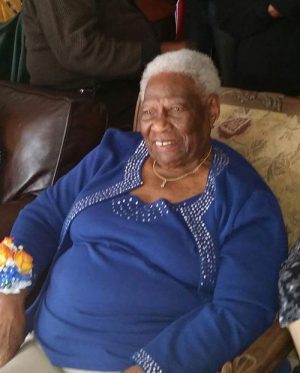
BERLIN – These days, Josephine Anderson spends her time “taking it easy.”
At 99 years old, she now resides in Bowie, Md., with her daughter.
But Anderson doesn’t let that stop her from keeping in touch with the friends she’s made and the students she’s taught in Worcester County, the place she’s called home for nearly a century.
“I’ve had a full life,” she said. “And I tell that to everybody.”
As a county resident, Anderson has witnessed some of the area’s most memorable events, including the formation of the Ocean City Inlet, the outbreak of World War II and the integration of Worcester County’s public school system, among other things.
Born on March 10, 1920, Anderson was the second of five children to Henry and Viola Showell. Growing up in Whaleyville, she attended first through seventh grade in a one-room church hall near her home.
At the time, schools were segregated, and Anderson recounts that some children walked from miles away to receive an education at one of the few African American schools in the area.
“We never got new books,” she said. “In the black schools, all the books and furniture you had came out of the white schools, and half of the books were ragged when you got them. But we survived.”
Anderson then attended eighth and ninth grade at the Flower Street School in Berlin. But because of the lack of transportation to the county’s all-black high school in Snow Hill, Anderson said she and her siblings completed their education at Salisbury High School, miles from where her parents worked.
“My mother was a cook at Salisbury Normal School (Salisbury University) and my father was in maintenance, so they had to be at work by 7 o’clock,” she said. “In the wintertime, we had to leave Whaleyville at about 5 in the morning because the cars in the ‘30s were slow and you didn’t have any windshield wipers … but we never missed a day of school, rain, shine, hail or snow.”
Anderson credits her parents for encouraging her education.
“My parents were very eloquent people and they encouraged the children to go to college,” she said. “When we went to the Berlin school and Salisbury and college, I think that encouraged a lot the black families living in Whaleyville to send their kids to school.”
During the summers, Anderson would join her parents in Ocean City, where they held jobs at the Maryland Inn on Caroline Street.
She said the hotel was a popular lodging spot for tourists and businessmen in its heyday. Today, the site is home to the Fun City arcade.
“My parents worked there in the summer because they didn’t have summer school at Salisbury State back in the day,” she said. “I used to go down there and babysit because my father was a waiter and my mother was a cook. When the guests came in and needed a babysitter, I was the one to look after them.”
Each summer until 1942, when she married her first husband, Anderson would return to the Maryland Inn to work for the owners, John and Luella Hagan. She lived and worked at the property seven days a week and held different positions, including bathhouse keeper and waitress.
She also remembers when Ocean City stopped at the Commander Hotel, on 14th Street.
“You had Philadelphia Avenue and Baltimore Avenue,” she said, “and where the Inlet is now, that was all sand and the fishermen would bring their boats in and have a truck carry the fish to spots in West Ocean City.”
On the Boardwalk – which at the time was elevated above a narrow beach – Anderson fondly remembers the rides and merry-go-round, Heppe’s Candy and listening to Louis Armstrong and Ella Fitzgerald perform.
She also remembers when the storm of 1933 swept through the resort and formed the Inlet.

“If you give to the world the best you have, the best will come back to you,” Josephine Anderson passing on some wisdom from her 99 years. She is pictured as a teacher in an image provided by the Germantown School Community Heritage Center. Submitted Images
“Then, when you worked in Ocean City, all the hotels on the ground floors had rooms sectioned off where the help stayed …,” she said. “That particular evening, we left the beach because our rooms were flooded and the next morning on our way back to work, we got on Old Bridge Road and when we got to the bay, the bridge was washed out. We had to turn around and go back home.”
Anderson said she returned to the bridge the next day to find temporary boards spanning the water.
“You had a railroad station and the trains came in there at the time, and all that was washed out too,” she said. “We had seen storms and stuff before, but this was the worst I had ever seen it.”
After graduating high school with honors, Anderson completed a three-year education at Maryland Normal and Industrial School at Bowie in 1939 and later returned to earn a bachelor of science in education in 1941 as a member of the college’s first four-year graduation class.
Following her college graduation, and the outbreak of World War II, Anderson found employment at the U.S. Department of the Treasury in Washington, D.C. It was there that she witnessed the introduction of food and gas rationing and the funeral procession of Franklin D. Roosevelt.
“We were allowed to go out to the street and watch the parade,” she said. “I watched the horses and casket go by.”
While she doesn’t recall much about the day Pearl Harbor was bombed, Anderson said she does remember a Whaleyville resident, Clyde Jackson Rawson, had died in the attack while serving in the Navy. Rawson was the first Worcester County resident to die in World War II.
In 1946, Anderson returned to Worcester County, where she taught at Mount Wesley, a small schoolhouse in Snow Hill. The next year she was moved to the Germantown School, where she served as a teacher and principal until the school closed in the 1950s.
There, she taught roughly 50 fourth-, fifth- and sixth-grade students at a time in one of the two rooms. When she couldn’t find a janitor to clean the building, she and her students would do it themselves.
“I often wonder how the teachers, me included, managed to teach all the subjects to each grade every day and do the stuff we did,” she said. “There were no skipping days.”
From there, Anderson moved to the Flower Street School, where she taught until Worcester County schools were integrated in 1970. For the next 13 years, she would teach sixth-grade social studies at Berlin Middle School.
“When I went to the middle school, I was never so happy,” she said. “It was so much different.”
Anderson also noted the kindness of the teachers, parents and students.
“When they actually integrated in 1970 and we went to the different schools, it was so nice because you were treated with respect,” she said.
In her 38 years as an educator, Anderson said she taught future lawyers, insurance agents and pharmacists. She said many of her former pupils still remember her.
“I still have kids, both white and black, that will contact me …,” she said. “My grandson says I know everyone. I tell him, ‘From Newark to Selbyville, from Ocean City to Whaleyville, yes.’ I could tell you at that time where each person I taught lived. I was probably the only teacher at the Berlin Middle School then that could do that.”
Throughout her years in Worcester County’s public school system, Anderson worked under the leadership of seven superintendents while serving as a teacher, principal and mentor. She recalls her starting salary was $65 a month.
Following her retirement in 1983, Anderson visited the Caribbean Islands, all 50 states and parts of Canada.
“I wanted to see all the things I had taught to my students,” she said.
She also worked on various committees in Worcester County, including the Worcester County Commission on Aging and Diakonia, to name a few.
But despite her reputation as a pioneer in her community, Anderson noted she is most proud of seeing her daughter and grandchildren grow up, graduate college and become successful citizens.
“That’s very special to me,” she said. When asked her secret to a long, successful life, Anderson pointed to her life’s motto.
“If you give to the world the best you have, the best will come back to you,” she said. “Be kind to people, and do the best you can.”

